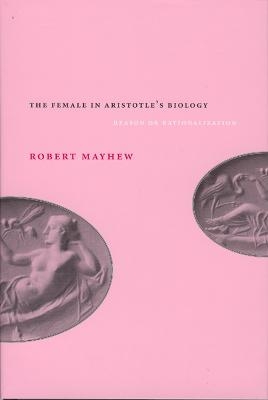
The Female in Aristotle's Biology
Reason or Rationalization
Seiten
2004
|
2nd ed.
University of Chicago Press (Verlag)
978-0-226-51200-6 (ISBN)
University of Chicago Press (Verlag)
978-0-226-51200-6 (ISBN)
- Titel ist leider vergriffen;
keine Neuauflage - Artikel merken
Robert Mayhew sets out not to defend Aristotle's ideas about females, but to defend the philosopher against the common charge that his writings on animals were motivated by ideological bias.
While Aristotle's writings on biology are considered to be among his best, the comments he makes about females in these works are widely regarded as the nadir of his philosophical oeuvre. In The Female in Aristotle's Biology, Robert Mayhew aims not to defend Aristotle's ideas about females but to defend Aristotle against the common charge that his writings on animals were motivated by ideological bias. Mayhew points out that the tools of modern science and scientific experimentation were not available to the Greeks during Aristotle's time and that, consequently, Aristotle relied not only on empirical observations when writing about living organisms but also on a fair amount of speculation. Further, he argues that Aristotle's remarks about females in his biological writings did not tend to promote the inferior status of ancient Greek women. Written with passion and precision, The Female in Aristotle's Biology will be of enormous value to students of philosophy, the history of science, and classical literature.
While Aristotle's writings on biology are considered to be among his best, the comments he makes about females in these works are widely regarded as the nadir of his philosophical oeuvre. In The Female in Aristotle's Biology, Robert Mayhew aims not to defend Aristotle's ideas about females but to defend Aristotle against the common charge that his writings on animals were motivated by ideological bias. Mayhew points out that the tools of modern science and scientific experimentation were not available to the Greeks during Aristotle's time and that, consequently, Aristotle relied not only on empirical observations when writing about living organisms but also on a fair amount of speculation. Further, he argues that Aristotle's remarks about females in his biological writings did not tend to promote the inferior status of ancient Greek women. Written with passion and precision, The Female in Aristotle's Biology will be of enormous value to students of philosophy, the history of science, and classical literature.
Robert Mayhew is associate professor of philosophy at Seton Hall University. He is the author of Aristotle's Criticism of Plato's Republic.
| Erscheint lt. Verlag | 10.9.2004 |
|---|---|
| Sprache | englisch |
| Maße | 167 x 238 mm |
| Gewicht | 362 g |
| Themenwelt | Geisteswissenschaften ► Philosophie ► Philosophie Altertum / Antike |
| Sozialwissenschaften ► Soziologie ► Gender Studies | |
| ISBN-10 | 0-226-51200-2 / 0226512002 |
| ISBN-13 | 978-0-226-51200-6 / 9780226512006 |
| Zustand | Neuware |
| Haben Sie eine Frage zum Produkt? |
Mehr entdecken
aus dem Bereich
aus dem Bereich
mit Sokrates, Seneca, Platon & Co. im Gespräch
Buch | Hardcover (2023)
FinanzBuch Verlag
18,00 €


